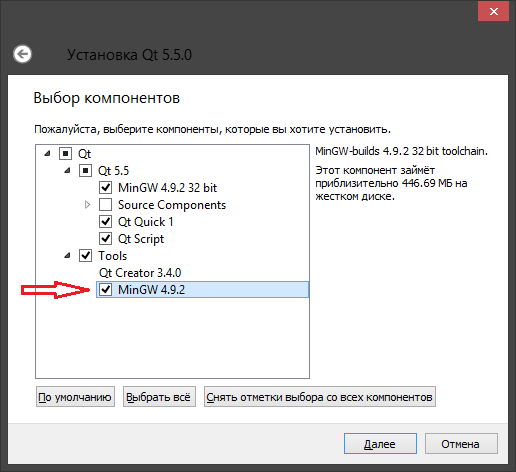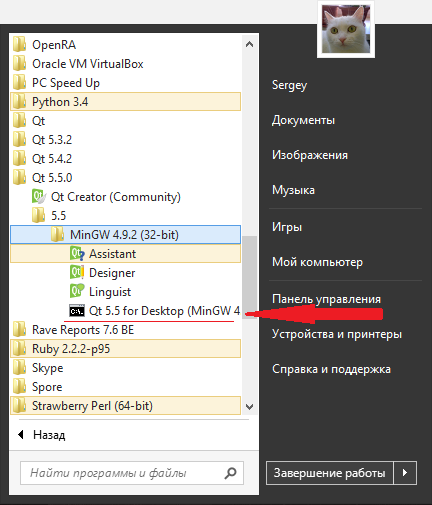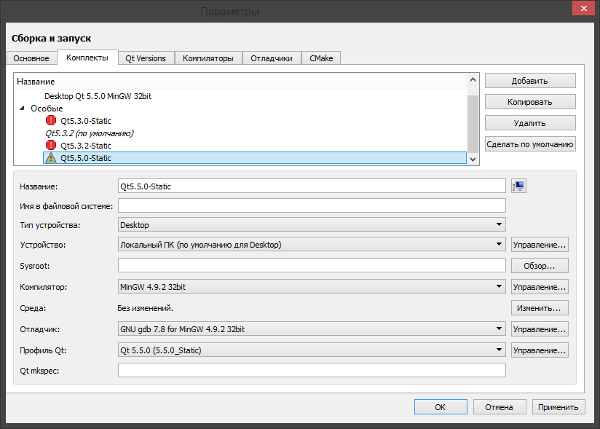Static build dll-library with QtQuick modules
 Good day, readers. In this article I will try to tell as much as possible about how I built a statically dll library with QtQuick modules. Climbing all the Internet, I could not find a solution to my problem, but it turned out to be under my nose.
Good day, readers. In this article I will try to tell as much as possible about how I built a statically dll library with QtQuick modules. Climbing all the Internet, I could not find a solution to my problem, but it turned out to be under my nose.I will begin from the very beginning, namely: from Qt weaning from libraries * .dll. Operated: Qt-windows-x86-MinGW-5.5.0-rc, snapshot 95 from 2015.06.17 . Work Environment: Windows 8.1
I know that such articles have already accumulated a decent handful, but what to do ... I had to rebuild different versions of Qt four times before the dll he collected started loading as it should. Immediately I will warn you that QtWebKit will be cut out in this build. If you already have a static Qt build, feel free to scroll through this manual to the most interesting .
So let's get started!
- Download the required set of software:
- in fact, Qt 5.5.0-rc itself ( I can't say that this link will survive after the official release of version 5.5.0 )
- Qt-src-5.5.0-rc
- Perl ( version at build time: 5.22.0.1 )
- Python ( 3.4.3 )
- Ruby ( 2.2.2 )
It is possible that Python and Ruby are not needed at all, but since In all the manuals, both of them appear as "mandatory" and we absolutely do not need surprises, we will install them.
') - Install / unpack to any directory. I had C: / Qt for Qt and its sources, and C: / dev for the rest of the software. When installing Qt, be sure to check the Qt -> Tools -> MinGW checkbox.Installation configuration

Source Components should not be installed, we downloaded them separately in the archive (already, probably, unpacked?), And we will work with them.Tree- C: / dev / StrawberryPerl
- C: / dev / Ruby22
- C: / dev / Python34
- C: /Qt/Qt5.5.0 - Qt version installed
- C: /Qt/qt-everywhere-opensource-src-5.5.0-rc - unpacked source
- Edit qmake configuration:
- open the qt-everywhere-opensource-src-5.5.0-rc / qtbase / mkspecs / win32-g ++ / qmake.conf file
- find the string
QMAKE_LFLAGS =
and replace it with:QMAKE_LFLAGS = -static -static-libgcc
Mysterious bug c qmldebugger
irrelevant in new versions, skip this steplib\libQt5Qml.a(qqmldebugserver.o):qqmldebugserver.cpp: undefined reference to `QTcpServerConnection::QTcpServerConnection()'FixBecause of this bug, in fact, I had to collect two of the four versions of Qt, until I found a description of the problem on the Internet. Unfortunately, I did not understand what place this patch should have been patched (I will be glad if you tell me), so I acted extremely radically and ugly: treacherously cut out the problematic line from the source. I think to practice such acts is not worth it, but once you can =)
Ps: I'm not quite sure that it was in the end that saved my time and nerves, because at the same time with this change, I added the -qml-debug parameter to the collector. If you want to risk and sacrifice your time, then do not change the source code, but configure the assembly with the -qml-debug parameter, perhaps the problem will become irrelevant.
Go to the qt-everywhere-opensource-src-5.5.0-rc \ qtdeclarative \ src \ qml \ debugger directory , open the malicious qqmldebugserver.cpp file and comment on the objectionable line:#if defined(QT_STATIC) && ! defined(QT_NO_QML_DEBUGGER) // #include "../../plugins/qmltooling/qmldbg_tcp/qtcpserverconnection.h" <---- #endif- We start the MinGW terminalStart -> All Programs -> Qt 5.5.0 -> 5.5 -> MinGW

and we feed him something like this code:# ! set QTSRC=C:\Qt\qt-everywhere-opensource-src-5.5.0-rc set MINGWPATH=C:\Qt\Qt5.5.0\Tools\mingw492_32\bin set QTPREFIX=C:\Qt\5.5.0_Static set PYPATH=C:\dev\Python34 set PERLPATH=C:\dev\Strawberry\perl\bin set RUBYPATH=C:\dev\Ruby22\bin
Where:
QTSRC - unpacked Qt sources
MINGWPATH - the path to the MinGW installed with Qt
QTPREFIX - the place where the Qt static assembly will be installed
PYPATH - the path to the installed Python
PERLPATH - Perla bin folder path
RUBYPATH - path to the Ruby bin folder
Further:set QTDIR=%QTSRC%\qtbase set PATH=%PATH%;%MINGWPATH%;%PYPATH%;%PERLPATH%;%RUBYPATH%;%QTDIR%/bin cd %QTSRC% mkdir nomake move qtwebkit nomake move qtwebkit-examples nomake
this is where binary search paths are set, and the last three lines cut WebKit from the assembly (the -no-webkit flag has disappeared somewhere from the configuration file). I want to note that to connect plug-ins without a tambourine, it will not be enough to assemble only one qtbase, so we go to the folder with the source % QTSRC% and collect everything that is there. - Run the configurator:
configure -static -release -opensource -confirm-license -opengl desktop -no-angle -qml-debug -c++11 -platform win32-g++ -qt-zlib -qt-pcre -qt-libpng -qt-libjpeg -qt-freetype -no-openssl -make libs -make tools -nomake examples -nomake tests -prefix %QTPREFIX%shotaku?- -static - no comments;
- -release - specify that we will only collect the Release version (if you need debug, then change to -debug );
- -opensource -confirm-license - agree with the license;
- -opengl desktop build for "desktop";
- -no-angle - “will get rid of libEGL, libGLES”, thanks Taraflex : Toster ;
- -qml-debug - we allow debag Kumla. The same parameter that possibly cures bazhig with qmldebugger (point 4);
- -c ++ 11 - ... - we allow to use;
- -platform win32-g ++ - target platform ( yes, only 32 bits );
- -qt-zlib -qt-pcre -qt-libpng -qt-libjpeg -qt-freetype - buns;
- -no-openssl - disable ssl (I did not need it);
- -make libs - this is useful for us to build dll-library;
- -make tools are tools of dubious necessity, which I decided to keep. It seems to be an assistant, designer and linguist. If you do not need it, replace it with -nomake tools ;
- -nomake examples -nomake tests - examples and tests. They gather about-oh-oh-oh-ry long, so it is better not to include;
- -prefix% QTPREFIX% - specify where the future build will be installed. ( % QTPREFIX% was specified at the very beginning of the fifth paragraph);
- if you need any other modules, for example, sqlite , then read the README or use the configure -help command to find out which parameter you need to add to the configurator.
- Run the build:
mingw32-make -k
ps if you have a multi-core processor, you should indicate to the builder their number with the -j parameter [ number of cores - 1 ] . Those. for my 4-core processor, I launched the assembler like this:mingw32-make -k -j3
the parameter - k seems to order the collector to stop, if suddenly "something went wrong." This unpleasant situation did not touch me, so I will not argue. - Run the installation:
mingw32-make install
after that, we should have a % QTPREFIX% directory with the collected libraries. - Add a kit to build statics:
- Run QtCreator , which was installed with Qt5.5.0-rc
- go to Tools> Options ...> Build and Run> Qt Versions , add a new qmake from the % QTPREFIX% \ 5.5.0 \ bin directory , call it something like this: " Qt% {Qt: Version} (% {Qt: Version} _Static) "and click the button" Apply "Qt Versions

- go to the " Kits " tab, click " Add ", call it something like this: " Qt5.5.0-Static ", compiler: MinGW , profile: " Qt% {Qt: Version} (% {Qt: Version} _Static) " , click the " OK " buttonKits

That's all. And now, finally, the most interesting .
Static build dll-library with QtQuick modules
Create a new project in QtCreator:
- File> Create Project ...> Library> C ++ Library> Dynamic Library
- choose the build kit we created ( Qt5.5.0-Static )
- open the file % project-name% _global.h
The whole point of the fact that dll-libraries were not going to statically ( or rather they were going to be, but were not working ) was that the template ( TEMPLATE ) used to build the DLL ( lib ) does not include linking of plug-ins. Therefore, all of them need to register manually in the header and .pro-file .
Get a list of all the necessary plug-ins was not difficult:
- create a new project " Qt Quick Application "
- compile it with the same set of Qt5.5.0-Static ( do not forget to specify the release build type )
- go to the directory with the collected project: build- % project_name% -Qt5.5.0_Static-Release and see two files:
- % project_name% _plugin_import.cpp
- % project_name% _qml_plugin_import.cpp
they also contain a list of all plugins that are loaded for a regular Qml application, namely:#include <QtPlugin> Q_IMPORT_PLUGIN(QWindowsIntegrationPlugin) Q_IMPORT_PLUGIN(QDDSPlugin) Q_IMPORT_PLUGIN(QICNSPlugin) Q_IMPORT_PLUGIN(QICOPlugin) Q_IMPORT_PLUGIN(QJp2Plugin) Q_IMPORT_PLUGIN(QMngPlugin) Q_IMPORT_PLUGIN(QTgaPlugin) Q_IMPORT_PLUGIN(QTiffPlugin) Q_IMPORT_PLUGIN(QWbmpPlugin) Q_IMPORT_PLUGIN(QWebpPlugin) Q_IMPORT_PLUGIN(QtQuick2Plugin) Q_IMPORT_PLUGIN(QTcpServerConnection) Q_IMPORT_PLUGIN(QGenericEnginePlugin) Q_IMPORT_PLUGIN(QNativeWifiEnginePlugin) Q_IMPORT_PLUGIN(QtQuick2WindowPlugin)
all this trouble you need to add the library header file ( % project-name% _global.h
In the same directory, open the Makefile.Release file and retrieve the necessary information from there, namely: a list of libraries that should be connected to the project:
LIBS = -lmingw32 -LC:/Qt/5.5.0_Static/lib -lqtmain -LC:/Qt/5.5.0_Static/qml/QtQuick.2 -lqtquick2plugin -LC:/Qt/5.5.0_Static/qml/QtQuick/Window.2 -lwindowplugin -LC:/Qt/5.5.0_Static/plugins/platforms -lqwindows -lwinspool -lshlwapi -lQt5PlatformSupport -lqtfreetype -LC:/Qt/5.5.0_Static/plugins/imageformats -lqdds -lqicns -lqico -lqjp2 -lqmng -lqtga -lqtiff -lqwbmp -lqwebp -LC:/Qt/5.5.0_Static/plugins/qmltooling -lqmldbg_qtquick2 -lQt5Quick -lQt5Gui -lcomdlg32 -loleaut32 -limm32 -lwinmm -lglu32 -lopengl32 -lgdi32 -lqtharfbuzzng -lqmldbg_tcp -lQt5Qml -LC:/Qt/5.5.0_Static/plugins/bearer -lqgenericbearer -lqnativewifibearer -lQt5Network -ldnsapi -lQt5Core -lole32 -luuid -lws2_32 -ladvapi32 -lshell32 -luser32 -lkernel32 -lmpr -lqtpcre All this will need to be added to the .pro file of your future project (the list may differ, depending on your version and which modules you turned on / off when building Qt, so better copy this list from your PC ). It does not hurt to add the path to the Qt static assembly header files:
INCLUDEPATH += C:/Qt/Qt5.5.0_Static/include After you make these changes to the project, you can build the QtQuick mini-framework as a single DLL. What do you do with it, I do not know, but I hope someone will find this information useful :)
.pro-file of my project 'MyDll'
QT += core widgets qml quick CONFIG += dll TEMPLATE = lib TARGET = mydll DEFINES += MYDLL_LIBRARY SOURCES += mydll.cpp HEADERS += mydll.h \ objectfactory.h INCLUDEPATH += C:/Qt/Qt5.5.0_Static/include LIBS += -lmingw32\ -LC:/Qt/5.5.0_Static/lib -lqtmain\ -LC:/Qt/5.5.0_Static/qml/QtQuick.2 -lqtquick2plugin\ -LC:/Qt/5.5.0_Static/qml/QtQuick/Window.2 -lwindowplugin\ -LC:/Qt/5.5.0_Static/plugins/platforms -lqwindows -lwinspool -lshlwapi -lQt5PlatformSupport -lqtfreetype\ -LC:/Qt/5.5.0_Static/plugins/imageformats -lqdds -lqicns -lqico -lqjp2 -lqmng -lqtga -lqtiff -lqwbmp -lqwebp\ -LC:/Qt/5.5.0_Static/plugins/qmltooling -lqmldbg_qtquick2 -lQt5Quick -lQt5Gui -lcomdlg32 -loleaut32 -limm32 -lwinmm -lglu32 -lopengl32 -lgdi32 -lqtharfbuzzng -lqmldbg_tcp -lQt5Qml\ -LC:/Qt/5.5.0_Static/plugins/bearer -lqgenericbearer -lqnativewifibearer -lQt5Network -ldnsapi -lQt5Core -lole32 -luuid -lws2_32 -ladvapi32 -lshell32 -luser32 -lkernel32 -lmpr -lqtpcre mydll.h
#ifndef MYDLL_H #define MYDLL_H #include <QtPlugin> Q_IMPORT_PLUGIN(QWindowsIntegrationPlugin) Q_IMPORT_PLUGIN(QDDSPlugin) Q_IMPORT_PLUGIN(QICNSPlugin) Q_IMPORT_PLUGIN(QICOPlugin) Q_IMPORT_PLUGIN(QJp2Plugin) Q_IMPORT_PLUGIN(QMngPlugin) Q_IMPORT_PLUGIN(QTgaPlugin) Q_IMPORT_PLUGIN(QTiffPlugin) Q_IMPORT_PLUGIN(QWbmpPlugin) Q_IMPORT_PLUGIN(QWebpPlugin) Q_IMPORT_PLUGIN(QtQuick2Plugin) Q_IMPORT_PLUGIN(QTcpServerConnection) Q_IMPORT_PLUGIN(QGenericEnginePlugin) Q_IMPORT_PLUGIN(QNativeWifiEnginePlugin) Q_IMPORT_PLUGIN(QtQuick2WindowPlugin) #include <QGuiApplication> #include <QQuickView> class MyDll { ... }; #endif Source: https://habr.com/ru/post/261479/
All Articles